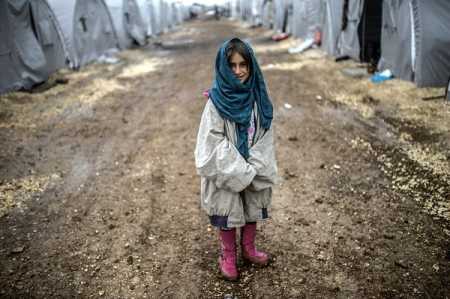|
Wed, 19 Nov, 2014 01:59:46 AM FTimes-STT-Xinhua Report, Nov 19  File picture of a Kurdish refugee girl stands during a rainy day at the Rojova Camp, in Suruc, a rural district of Sanliurfa Province, on October 30, 2014. Photo AFP-LEHTIKUVA Finland acts in an exemplary way in the fight against statelessness, observed the latest report by the United Nations High Commission for Refugees (UNHCR).A child born in Finland becomes a Finnish national automatically, if the child would otherwise be rendered stateless; however, in Sweden, this is not the case, the report pointed out. In Finland, one cannot lose Finnish citizenship, in case the action renders the individual stateless. The report prepared by Anne Laakko, a UNCHR legal officer on matters related to statelessness, said determination of one’s stateless has, however, been made so difficult. As a result of this, many people find it difficult to prove that they are stateless. In Finland, a few thousand people live as stateless. Statelessness may result to problems in Finland, in cases where necessary documents cannot be provided.
Earlier, on November 4, the news agency Xinhua reported: The Office of the United Nations High Commissioner for Refugees (UNHCR) on Tuesday launched a ten-year global campaign aimed at ending the statelessness which affects millions of people around the world.
According to the UN refugee agency, at least 10 million people worldwide are currently stateless and a baby is born stateless every 10 minutes.
A stateless person is often denied the rights and services that countries normally offer their citizens, including the access to education, medical care, legal employment or free movement, and those who lack any nationality often cannot enjoy the human rights protections that go with it, as UNHCR highlighted.
The “I Belong” campaign is being launched as over 100 state parties have acceded to the two statelessness treaties, namely the 1954 UN Convention relating to the Status of Stateless Persons, and the 1961 Convention on the Reduction of Statelessness, said UNHCR, stressing that such progress increased the possibility of eradicating statelessness.
However, growing number of major conflicts, including those in Syria and Central African Republic, have forced millions of people into internal displacement or into becoming refugees, which posed new risks.
One resulting challenge is that tens of thousands of refugee children have been born in exile, and many lack essential documents and may face difficulties in proving they are citizens.
UNHCR insisted that with enough political will, statelessness can be resolved. Alongside launching the campaign, the UN agency also released a ten-point Global Action Plan to End Statelessness which aims both to resolve major existing crises and to ensure no child is born stateless in the future.
“Statelessness makes people feel like their very existence is a crime. We have a historic opportunity to end the scourge of statelessness within 10 years, and give back hope to millions of people. We cannot afford to fail this challenge,” said Antonio Guterres, UN High Commissioner for Refugees, in a statement. More News
|
|
Finland Times
| Sunday, 28 April, 2024 |

